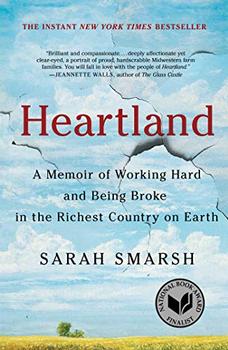Summary | Excerpt | Reading Guide | Reviews | Beyond the Book | Readalikes | Genres & Themes | Author Bio

A Memoir of Working Hard and Being Broke in the Richest Country on Earth
by Sarah Smarsh
We lived past the county line, in Kingman County, where no elected official would dream of banning any class of fireworks. The people of our county were farmers who drove enormous combines with giant, sharp blades that cut the wheat; carpenters who built their own giant sheds by swinging hammers while perched high on wooden rafters; and women who held down calves to inject vaccinations before they drove four-wheel-drive pickups to office jobs on the brick streets of small towns. They could handle their firecrackers.
In June, Mom drove to a wholesale warehouse on a blacktop road through the prairie. She wrote a check for hundreds of heavy boxes of various fireworks manufactured in China. Strings of Black Cats, TNT-brand variety packs, M-80s, M-60s, bottle rockets, children's sparklers and smoke bombs, little hens that shot glowing eggs out of their behinds, and cardboard columns that released quiet, pretty fountains of colorful sparks and had names like Springtime Sunrise.
Dad and Grandpa Arnie hammered together a vending stand with lumber out of a scrap pile Dad kept in our shed. They loaded the wooden stand onto a hayrack and pulled it down the county blacktop to the gravel parking lot of Kampling's Live Bait Shop, which stood at the entrance to Cheney Lake, a draw for people over the holiday weekend.
The fireworks stand was a narrow rectangle with a roof, a counter for customers to approach, and a visible rack of shelves on the back wall. Mom and Grandma Betty lined the shelves with merchandise, taking breaks to smoke Marlboros and stare at the horizon with weary looks. I was almost four years old and held red-white-and-blue bunting to the counter as they stapled it in place, the thick, smelly plastic blowing in the wind and sticking to our sweaty, dusty legs.
Dad hauled his power generator from our shed to the fireworks stand. It would run electricity to lightbulbs strung overhead, and to the blinking arrow sign he had rented and situated in the prairie grass next to the blacktop road. When the sun set, the sign's little bulbs flickered to life, and June bugs buzzed against them.
The morning we opened for business, the people of Wichita appeared from the east, pulling speedboats behind pickups and carrying wallets full of cash. They bought heaps of fireworks and headed off through the lake entrance for a long weekend. Grandma Betty, her short blond hair darkened by sweat at the neck, counted the growing pile of bills in our cash box.
Dad and Grandpa Arnie spent the days in the fields, cutting wheat with combines or, after harvest, plowing the stubble under. In the evening, they arrived to help at the fireworks stand. Sunburned, eyes tired, whiskers full of dust and bits of straw, they moved heavy boxes and drank beer and laughed.
My older cousin Shelly and I played with bugs in the hot dirt and wrote fizzy sparklers across the dark sky until Shelly, who could be meaner than any boy and was tougher than most of them, shoved a firecracker up a frog's butt and lit the wick, which made me cry. Shelly's skinny teenage sister, Candy, stood near the ditch and waved in cars from the road, twirling a baton and wearing a stars-and-stripes bikini and garters. She had a paper Uncle Sam top hat over her short, sandy hair. Neighbor farmers waved when they passed. Everyone was covered in a thin film of dust.
When the stand closed around midnight, Dad spent the night sitting in his parked pickup, a loaded shotgun on the seat beside him, in case someone had a mind to rob us. There was security in guns for good reason where we lived. What we owned wasn't locked in a bank but sitting in a wooden stand with plastic bunting flapping in the prairie wind.
"You can't be too careful," he'd say, holding his gun with respect for the weapon but no pride about carrying it.
When it was all over, the morning after the Fourth, Mom and Dad counted and rubber-banded the bills. Once they paid off the wholesale supplier, the county permit, and the family help, they had a fortune of a few thousand dollars. It would come in handy, as Mom's belly was large with a baby that would be born in the fall.
* * *
Mom and Dad had their first fireworks stand the year Reagan was reelected—selling American pride in a field next to a two-lane blacktop while think tanks sold "trickle-down" economics. It's funny that both of their children were born weeks before an election that Reagan won. We would be able to map our lives against the destruction of the working class: the demise of the family farm, the dismantling of public health care, the defunding of public schools, wages so stagnant that full-time workers could no longer pay the bills. Historic wealth inequality was old news to us by the time it hit newspapers in the new millennium. That's the
Excerpted from Heartland by Sarah Smarsh. Copyright © 2018 by Sarah Smarsh. Excerpted by permission of Scribner. All rights reserved. No part of this excerpt may be reproduced or reprinted without permission in writing from the publisher.
Your guide toexceptional books
BookBrowse seeks out and recommends the best in contemporary fiction and nonfiction—books that not only engage and entertain but also deepen our understanding of ourselves and the world around us.